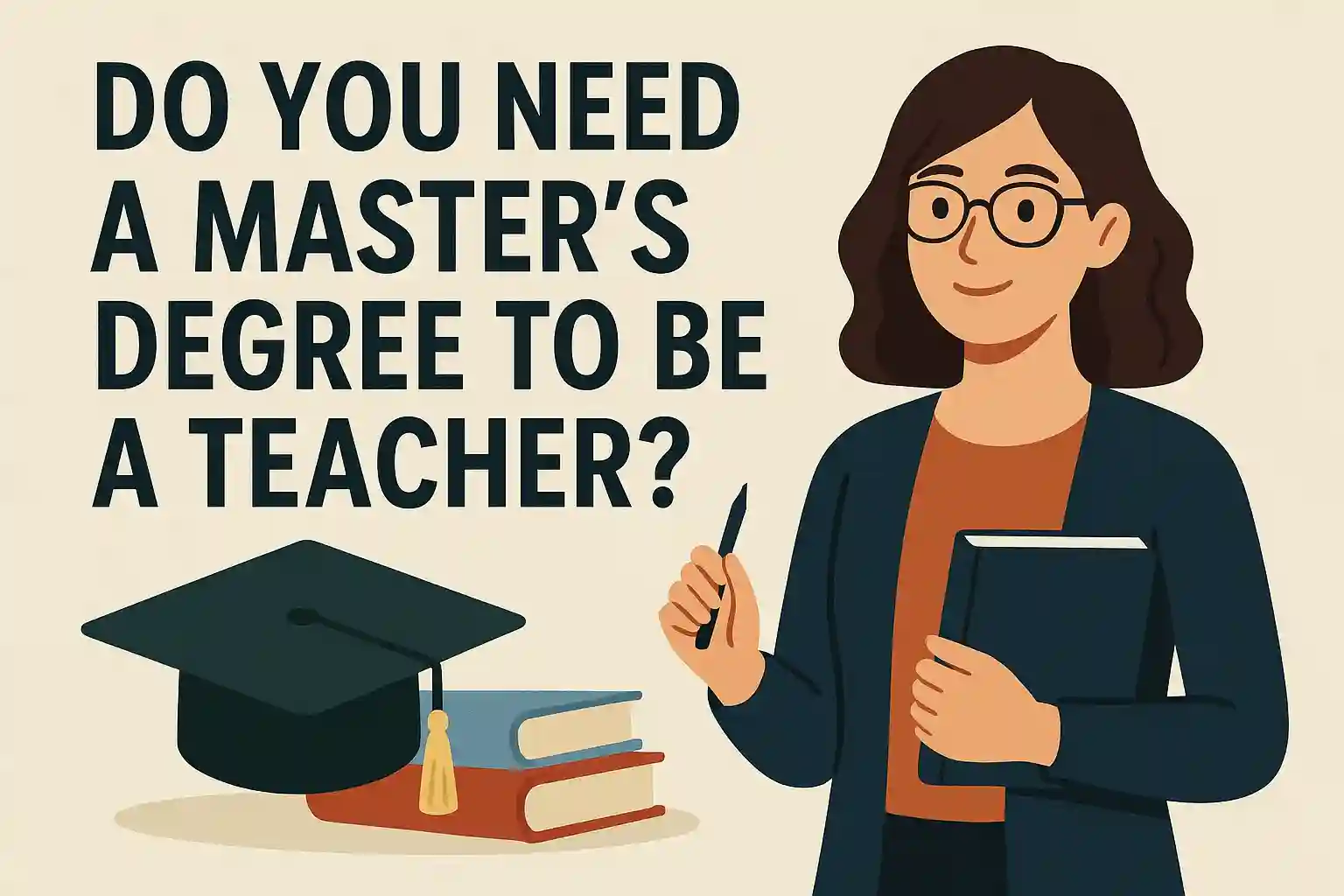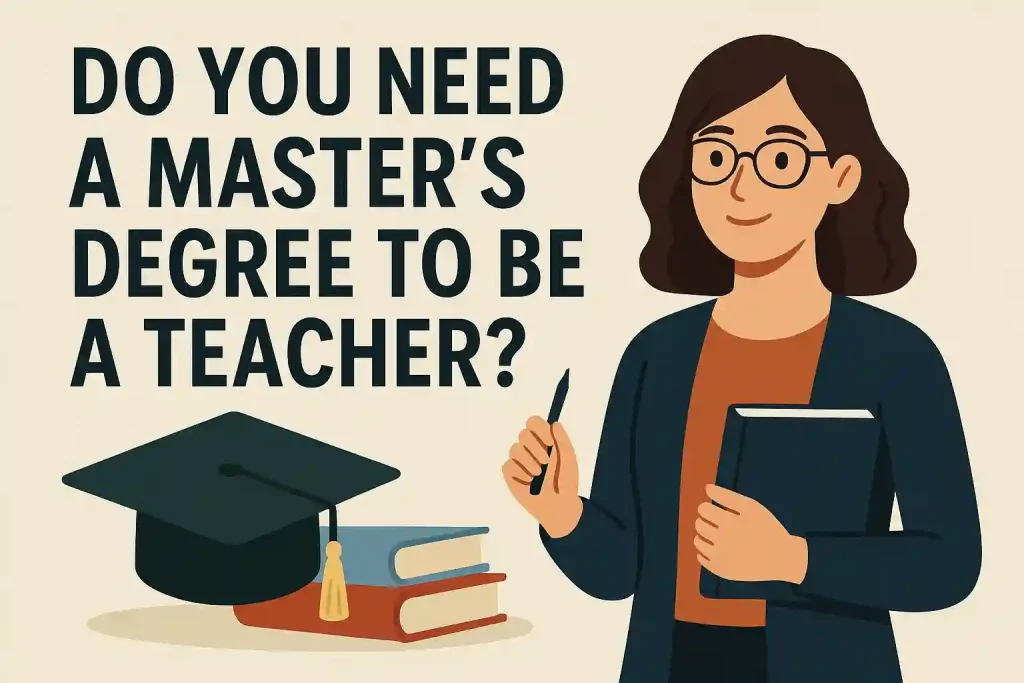Do You Need a Master’s Degree to Be a Teacher: A Complete Guide
Do you need a master's degree to be a teacher?

Teaching is one of the most respected and impactful professions in society. Every generation of doctors, engineers, scientists, artists, and leaders once sat in the classrooms of dedicated teachers. But if you’re considering a career in teaching, you may be asking yourself: “Do you need a master’s degree to be a teacher?”
This is one of the most common questions aspiring educators face. Some believe that teaching always requires advanced degrees, while others argue that a bachelor’s degree is enough. The truth is not a simple yes or no—it depends on where you want to teach, what subject you want to teach, and what long-term career goals you have in education.
In this complete guide, we’ll explore the requirements for becoming a teacher, the role of master’s degrees in education, and whether pursuing one is worth your time, effort, and money. By the end, you’ll have a clear roadmap for your teaching career and an understanding of whether or not a master’s degree should be part of your journey.
Section 1: Understanding Teacher Education Requirements in the U.S.
Table of Contents
Before we discuss master’s degrees, it’s important to understand the baseline requirements to become a teacher in the United States.
The Typical Path to Becoming a Teacher
Most teachers follow this general path:
- Earn a bachelor’s degree (commonly in education, or in a subject like English, math, or science).
- Complete a teacher preparation program (sometimes built into the degree).
- Gain classroom experience through student teaching.
- Pass state certification or licensure exams.
- Apply for teaching positions.
The Role of a Bachelor’s Degree in Education
In most U.S. states, a bachelor’s degree is the minimum requirement for teaching. Many people earn a Bachelor of Arts in Education or Bachelor of Science in Education. Others may major in a specific subject area—such as history, biology, or mathematics and then complete a separate teacher certification program.
Certification and Licensure Requirements
Even after earning a degree, teachers must be certified by their state. This usually involves passing tests like the Praxis exams or state-specific assessments. Certification requirements vary, but nearly all states recognize that a bachelor’s degree plus certification is enough to begin teaching.
So, at the entry level, a master’s degree is not always required but that doesn’t mean it isn’t valuable.
Section 2: Do All Teachers Need a Master’s Degree?
The short answer: No, not all teachers need a master’s degree.
States Where a Bachelor’s Degree is Enough
In many states, you can teach K–12 with just a bachelor’s degree plus certification. States like Texas, Florida, and Arizona generally allow new teachers to begin their careers without a master’s.
States That Require a Master’s Degree for Licensure
However, some states are stricter. For example:
- New York requires teachers to earn a master’s degree within five years of starting their teaching career.
- Massachusetts has similar rules, expecting teachers to pursue advanced degrees for continued licensure.
This means that even if you start teaching with a bachelor’s degree, in some states you’ll need to eventually earn a master’s.
Public vs. Private Schools
Public schools usually follow state licensure rules. Private schools, on the other hand, often have more flexibility. Some private schools may hire teachers without full certification or without advanced degrees if they demonstrate subject expertise.
Section 3: Benefits of Getting a Master’s Degree in Teaching
Even when not required, pursuing a master’s degree can bring major advantages.
1. Higher Salary Potential
Teachers with master’s degrees generally earn more money than those with only a bachelor’s. According to data from the National Center for Education Statistics, teachers with master’s degrees earn on average $5,000–$10,000 more annually than those without. Over the course of a career, this difference adds up significantly.
2. Career Advancement Opportunities
A master’s degree can open doors to positions such as:
- Curriculum specialist
- Department chair
- Instructional coordinator
- Assistant principal or principal (often requires a master’s in educational leadership)
3. Stronger Job Security
School districts often view teachers with master’s degrees as more committed and qualified, which can lead to better job stability.
4. Expanded Subject Expertise
Graduate programs allow teachers to specialize in areas like literacy, STEM education, or special education, which makes them more versatile and valuable.
5. Personal Growth
Many teachers pursue a master’s not just for career reasons, but for personal fulfillment. Advanced studies can boost teaching confidence, improve classroom strategies, and increase overall effectiveness.
Section 4: Situations Where a Master’s Degree is Required
While a bachelor’s degree is enough in many situations, there are cases where a master’s degree becomes essential.
Special Education Teachers
Special education often requires specialized training beyond a bachelor’s. Many states expect teachers in this field to have or work toward a master’s in special education.
Certain States (New York, Massachusetts, etc.)
As mentioned, states like New York and Massachusetts require teachers to complete a master’s degree within a set timeframe to maintain their teaching license.
University-Level Teaching
If you want to teach at the college or university level, a master’s is usually the minimum requirement—and in many cases, a doctorate (PhD or EdD) is preferred.
Competitive Private Schools
Elite private schools sometimes require advanced degrees to maintain their reputation and ensure their teachers stand out.

Section 5: Alternatives to a Master’s Degree
If a full master’s degree seems daunting, there are alternatives that can still help you grow professionally.
Teacher Certification Programs
For career changers who already have a bachelor’s degree in another field, post-baccalaureate certification programs are a quicker path to the classroom.
Graduate Certificates
These are short programs focusing on specific teaching areas, such as STEM education, reading literacy, or ESL (English as a Second Language).
Professional Development & Continuing Education
Teachers can complete workshops and continuing education courses to renew licenses and stay updated, without committing to a full degree.
Online Programs
Flexible online certification and master’s programs allow teachers to learn while working full-time, reducing the burden of traditional graduate school.
Section 6: How Much Does a Master’s Degree in Teaching Cost?
Cost is one of the biggest considerations for teachers.
- Average tuition range: $20,000 – $60,000 depending on the institution.
- Online programs: Often cheaper, ranging from $10,000 – $30,000.
- Public universities vs. private universities: Public schools usually offer lower tuition, especially for in-state residents.
Return on Investment
The salary boost from a master’s may take a few years to offset tuition costs, but over the span of a teaching career, the financial benefits can outweigh the investment.
Section 7: Salary Comparisons – Bachelor’s vs. Master’s Level Teachers
Salary is one of the biggest motivators for pursuing advanced education.
- According to the National Education Association (NEA), teachers with a master’s degree earn on average $2,700 more per year at the start and up to $10,000 more per year mid-career compared to those with a bachelor’s degree.
- In some states, the salary difference can reach $15,000 annually.
- Over a 30-year teaching career, this could mean hundreds of thousands of dollars in additional earnings.
Section 8: Pros and Cons of Pursuing a Master’s Degree in Teaching
Pros
- Higher salary potential
- Stronger credentials
- Expanded career options
- Greater subject expertise
- Personal fulfillment
Cons
- High cost of tuition
- Time commitment (usually 2 years full-time, longer part-time)
- Stress of balancing work and study
- ROI depends on state and school district policies
Section 9: International Perspective
Education systems around the world have different requirements:
- United Kingdom: A Postgraduate Certificate in Education (PGCE) or a master’s is common, though not always mandatory.
- Canada: Most provinces require at least a bachelor’s in education, though a master’s can accelerate career growth.
- Australia: Teachers typically need a bachelor’s in education, though some advanced roles prefer master’s qualifications.
- Asia & Middle East: International schools often require advanced degrees, especially for competitive teaching roles.
Section 10: FAQs About Teachers and Master’s Degrees
Can I start teaching while pursuing a master’s?
Yes, in many states you can begin teaching with a bachelor’s and continue studying part-time.
Is an online master’s degree accepted?
Yes, as long as it comes from an accredited institution. Many teachers complete their master’s online.
How long does it take to earn a master’s in teaching?
Typically 2 years full-time or 3–4 years part-time.
Do principals need master’s degrees?
Yes, most school principals and administrators are required to have at least a master’s degree in education or educational leadership.
Conclusion
So, do you need a master’s degree to be a teacher? The answer is: Not always.
- For many K–12 teaching positions, a bachelor’s degree plus certification is enough to begin.
- In certain states and specialized roles, a master’s degree is required within a few years.
- Even when not mandatory, a master’s degree can bring higher pay, better job security, and greater opportunities for advancement.
Ultimately, the decision depends on your career goals, financial situation, and the state or country where you plan to teach. If your dream is to make teaching your lifelong profession and grow into leadership roles, a master’s degree can be one of the most valuable investments you’ll ever make.
>> Theft of property first degree in Alabama



